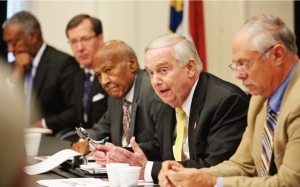Committee: SJAFB, Cherry Point top list
By Steve Herring
Published in News on October 25, 2013 1:46 PM

News-Argus/CASEY MOZINGO
N.C. Military Affairs Commission's Base Sustainability Committee Chairman Sonny Robert, fourth from left, asks a question during the committee's Thursday meeting at the City Hall Annex. From left are members Cornell Wilson Jr., Brad Ives, Mayor Al King, Roberts and Bob Dickerson.
The future of Seymour Johnson Air Force Base and Marine Corps Air Station Cherry Point should be a cause for concern for North Carolina, a member of the state's new Military Affairs Commission said.
It is a concern that the general public should share, MAC Sustainability Committee Chairman Sonny Roberts said following the committee's first meeting Thursday at the Goldsboro City Hall Annex.
Fueling that concern are the two bases' small size, as well as issues of encroachment, compatible land use, buffer zones and the need to continue protecting the Dare County bombing range used to train pilots, Roberts said.
Officials from the state's military installations and local support groups spoke during the four-hour session about the bases and their efforts to promote and to protect them.
They agreed there is a need to be proactive in addressing encroachment, buffer zones and other issues prior to the next round of the Base Closure and Realignment Commission.
At the conclusion of the meeting, committee member retired Maj. Gen. Robert "Bob" Dickerson summed up the issues targeted for legislative action.
They include, he said, air space management for both fixed and rotary wing aircraft; how the area will handle unmanned aerial vehicles; doing a better job of publicizing what is going on; better communications with local and state government and building partnerships, both public and private; lessening restrictions on people who are leaving the service as they seek employment and educational services; and maintaining focus on state projects that are approved, but not yet funded.
"These are just broad-based, blue arrows right now, but compatible land use issues -- they have got to continue what has been going on in the past at all of the installations," he said. "We have got to glean out of those initiatives that are working, those that have commonality across the board, that everybody else can use.
"In my opinion, if North Carolina has a single focus on how to address what is affecting the issues for each installation, it will be a better bang for the buck than by trying to do it piecemeal by each installation."
Speaking after the meeting, Roberts called the concern about Seymour Johnson and Cherry Point a "fact of life."
"The other bases -- Fort Bragg isn't going any place," he said. "Camp Lejeune is not going anywhere. New River, all of these other bases are pretty secure.
"But we have been on the list before at Cherry Point through BRAC, so we know how it is. We can't stick our head in the sand and think that we are bulletproof."
Convincing the public of an uncertain future is one of the hardest issues military supporters wrestle with, Roberts, a New Bern businessman, said.
People just don't believe anything is going to happen to their bases, he said.
"They say, 'Oh, Cherry Point is never going anywhere. They are there, don't worry about it,'" he said. "I am telling you, it is a good possibility. Or Seymour is a good possibility. But we have to go out and work for them, what it takes in Washington and on the state level and everything. We can't just roll over and think that we are here.
"That is a hard thing to balance because if you sound negative, which I do right now, then people say, 'You can't be negative. We have to be positive.' But if you say, 'No problem, they are here, don't worry about it, folks,' then how are you going to combat it?"
During the meeting, Roberts told those in attendance they have "a golden opportunity" to accomplish goals and to be proactive.
"We still have problems," he said. "I am not criticizing. I think we have come a long way in this state with the entire state realizing that the military is a big, big part of this state when it comes to industry and the economic impact."
The military and its role in North Carolina's communities have changed over the years, he said.
"Today, the military is just as large a part of this community as anyone else sitting around this room," he said. "In our schools, and in our churches and our committees and things out in our community, they play their part.
"They teach our children. They coach our children. They do everything. So that is another way to look at it. We are in a position to do something about it."
And that means focusing on base sustainability, he said.
"That involves the care and going forward with your bases to see that they are sustained as they increase and grow in the future," Roberts said. "That is going to be one of our main missions.
"This is to enhance and grow the relationships between the bases, the civilian community and working out all problems that exist there or might exist in the future. We must look at the military as a big part of our community in every way shape or form."
Also on the committee are retired Col. Joe Marm, who is a voting member, and ex officio members Mayor Al King, Col. Jeannie Leavitt, commander of the 4th Fighter Wing at Seymour Johnson Air Force Base, and state Rep. John Bell, who was unable to attend.
